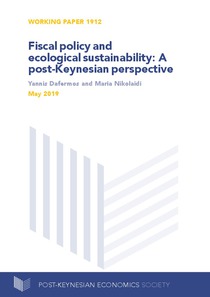Fiscal policy and ecological sustainability: a post-Keynesian perspective

Dafermos, Yannis ; Nikolaidi, Maria
Post-Keynesian Economics Society, Leeds
PKES - Leeds
2019
43 p.
fiscal policy ; sustainable development ; environmental policy ; decarbonization ; macroeconomics
Working Paper
1912
Public finance and taxation
English
Bibliogr.
"Fiscal policy has a strong role to play in the transition to an ecologically sustainable economy. This paper critically discusses the way that green fiscal policy has been analysed in both conventional and post-Keynesian approaches. It then uses a recently developed post-Keynesian ecological macroeconomic model in order to provide a comparative evaluation of three different types of green fiscal policy: carbon taxes, green subsidies and green public investment. We show that (i) carbon taxes reduce global warming but increase financial risks due to their adverse effects on the profitability of firms and credit availability; (ii) green subsidies and green public investment improve ecological efficiency, but their positive environmental impact is partially offset by their macroeconomic rebound effects; and (iii) a green fiscal policy mix derives better outcomes than isolated policies. Directions for future heterodox macroeconomic research on the links between fiscal policy and ecological sustainability are suggested."
Digital
The ETUI is co-funded by the European Union. Views and opinions expressed are however those of the author(s) only and do not necessarily reflect those of the European Union or the ETUI.